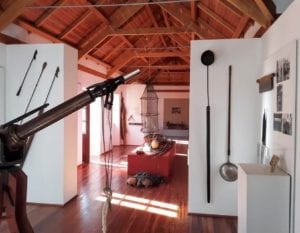
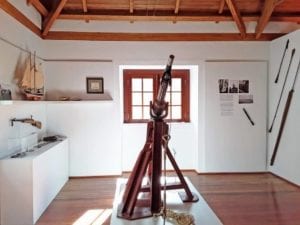
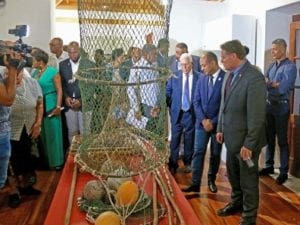
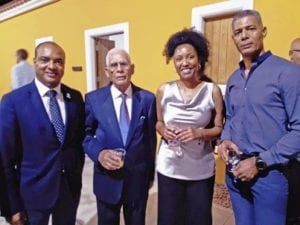
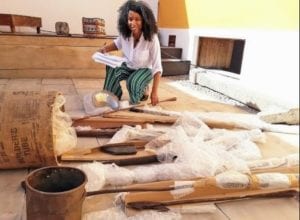
New Bedford Whaling Museum opens second exhibition in Cabo Verde
January 23, 2020
Exhibit celebrates “enduring connections” between two countries
NEW BEDFORD, Mass. — The New Bedford Whaling Museum has opened a collaborative exhibition at the recently inaugurated Museu da Pesca in São Nicolau, Cabo Verde. Titled A caça à baleia nos mares de Cabo Verde (Whaling in Our Cape Verdean Seas), the exhibition highlights Cape Verdeans’ involvement in the global whaling industry with the introduction of Yankee whalers to Cape Verdean shores. Curators at the Whaling Museum assisted the Museu da Pesca in designing and installing the exhibition after the Museum’s inauguration last November.
The new exhibition was mounted under a 2015 agreement between the Whaling Museum and the government of Cabo Verde. Under this agreement, objects gifted or on loan from the Whaling Museum have been on display at the Museu do Mar in São Vicente since 2016. The Whaling Museum also agreed to provide the Museu da Pesca—which was still under construction at the time—with objects and exhibit panels after its inauguration.
The inauguration was an historic marker of the diplomatic relationship between the U.S. and Cabo Verde, which has lasted for more than two centuries. Historical ties go back even further: 18th century Cape Verdean mariners joined the crews of American whaleships in pursuit of opportunity and over time, friends and family followed. The Port of New Bedford served as a veritable “Cape Verdean Ellis Island.” Successive waves of immigration from Cabo Verde and other Portuguese-speaking countries have made the region home to the largest Lusophone community in the United States.
Dignitaries in attendance at the Museu da Pesca inauguration included the Mayor of Tarrafal, José Freitas de Brito; Prime Minister Dr. Paulo Veiga, Cabo Verde Secretary of State for the Maritime Economy; and the U.S. Ambassador to Cabo Verde, Jeff Daigle, who remarked that he was “very impressed with the quality of the museum and hopes that Cape Verdeans will also be proud of what this museum represents for its history and the relationship between the two countries.”
Among the objects on display is a model of the packet ship Ernestina, which the Whaling Museum gifted to the Museu da Pesca to highlight Cape Verdean migration to the U.S. via the packet industry after the decline of whaling.
Dr. Akeia Benard, New Bedford Whaling Museum Curator of Social History, played a pivotal role in mounting the new exhibition. Benard traveled to Cabo Verde in December 2017 to take an inventory of Whaling Museum objects and panels and monitor the progress of the Museu da Pesca. After the inauguration, she returned to assist the museum’s curatorial team with the design and installation of the new exhibition.
In 2018, Benard learned that her great grandfather was a whaler from the island nation who arrived in New Bedford in 1917 on the packet Indiana and then was a boat steerer aboard the bark Wanderer in 1918 and 1921. When installing the new exhibition, she and her colleagues in São Nicolau included a photograph of her great grandfather standing at the bow of the Wanderer and readying his harpoon. “It was quite an experience to be able to ‘return’ him and his story to Cabo Verde as part of the celebration of the enduring connections between our two countries,” she said.
Contact
Evan England
Managing Director, NAIL[PR]
eengland@nailpr.cc
(401) 753-5588
About the New Bedford Whaling Museum
The New Bedford Whaling Museum ignites learning through explorations of art, history, science and culture rooted in the stories of people, the region and an international seaport. The cornerstone of New Bedford Whaling National Historical Park, the Museum is located at 18 Johnny Cake Hill in the heart of the city’s historic downtown. The Museum is open daily from 9 a.m. to 5 p.m. Admission is free for Whaling Museum members and children ages three and under; adults $19, seniors (65+) $17, students (19+) $12, child and youth $9. For more information visit www.whalingmuseum.org.

